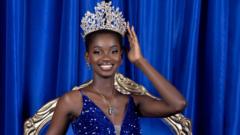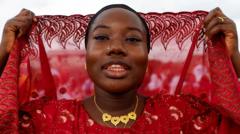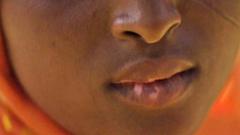The Miss Ivory Coast pageant's new regulations, banning wigs and extensions, aim to celebrate natural beauty and empower contestants, prompting discussions on beauty standards and economic implications.
Embracing Natural Beauty: Ivory Coast Bans Wigs in Pageantry

Embracing Natural Beauty: Ivory Coast Bans Wigs in Pageantry
A groundbreaking rule shifts beauty standards in Ivory Coast, allowing contestants to showcase their natural hair in a major beauty pageant tradition.
In an unprecedented move aimed at promoting natural beauty, the Miss Ivory Coast beauty pageant has banned wigs, weaves, and hair extensions in preliminary rounds. This decision comes as a significant shift in a country where the beauty industry has long favored artificial enhancements, using elaborate hairstyles as a common feature of beauty contests. Marlène-Kany Kouassi, who won the title in 2022 while sporting her short natural hair, has emerged as a beacon of this evolving standard.
Historically, contestants in Ivory Coast have invested heavily in achieving the ideal appearance often dictated by Western standards of beauty. However, change is on the horizon—beauty pageant organizers, led by Victor Yapobi, are striving to showcase the core beauty of participants through their own hair. Yapobi stated, "We want the candidates to be natural—whether with braids or straightened hair, it should be their own. Beauty must be raw."
The ban is particularly noteworthy, being the first of its kind in national competitions across Africa. This significant change aims not only to affirm natural beauty but also to encourage contestants' self-acceptance. Emmanuella Dali, a participant from the preliminary rounds, expressed her delight at the regulations, stating, “This rule gives me more pride as a woman - as an African woman.”
Beyond hair rules, the competition has relaxed other criteria, raising the age limit to 28, lowering entry fees, and allowing shorter contestants. This will likely make the event more accessible for many aspiring participants, who previously faced high financial burdens associated with entrance costs and styling.
Despite the enthusiasm surrounding these changes, the ban has sparked a debate throughout the nation. Many women in Ivory Coast love the versatility that wigs and extensions provide, and they are considered a form of self-expression and protection for natural hair. Controversy arises as hairstylist Ange Sea noted that this restriction could negatively affect businesses dependent on the lucrative wig market, valued at over $300 million.
The conversation surrounding this decision touches on deeper societal issues, including prevailing perceptions around professionalism, attractiveness, and self-identity among African women. Florence Edwige Nanga, a hair and scalp specialist, pointed out that even in professional settings, natural hair has not always been embraced.
As the discussion unfolds, activists and participants hope that this new direction will inspire broader acceptance of diverse beauty, impacting attitudes beyond the confines of beauty pageants. Yapobi mentioned receiving widespread applause for this initiative and declared that future decisions regarding wig policies for the finale of Miss Ivory Coast in 2025 remain open, emphasizing an ongoing commitment to reconnecting with authentic beauty standards.
For contestant Doria Koré, her victory symbolizes more than a title; it embodies the essence of African beauty. Emmanuella Dali concluded, “I didn’t win, but I feel proud. This is who I am.” This sentiment resonates powerfully against the backdrop of a changing cultural landscape, shining a light on the growing acceptance of natural beauty in Ivory Coast and beyond.


















